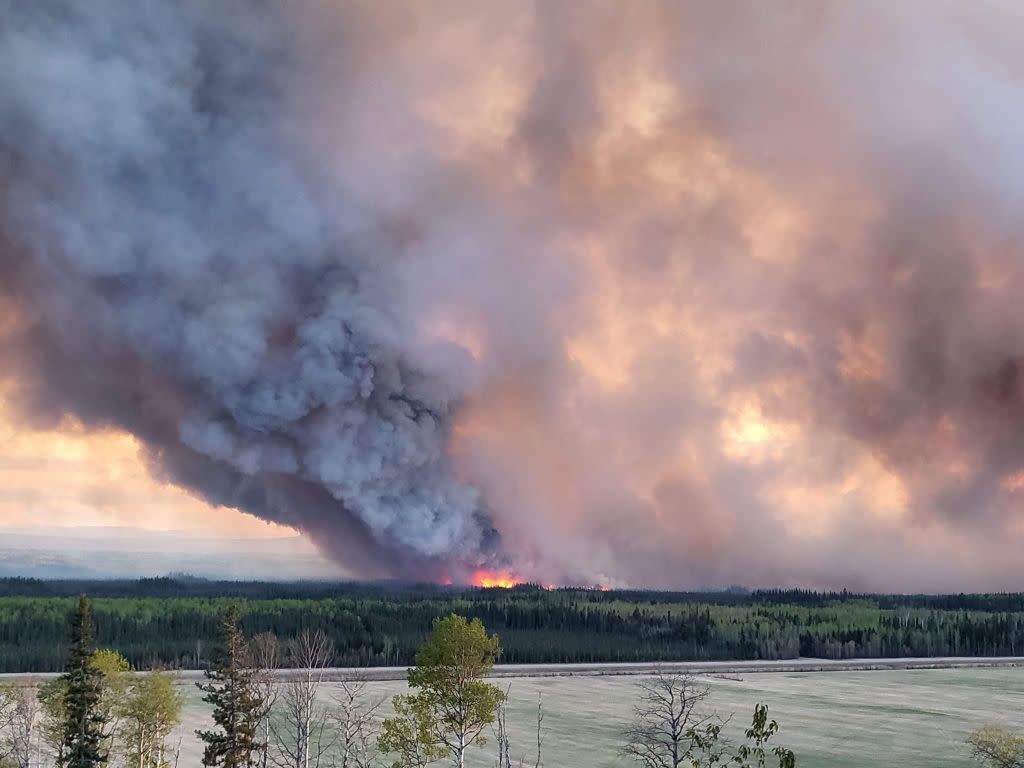How Inhaling Wildfire Smoke Can Affect You in the Long Term

Smoke rises after fire erupts in Western Canada on May 14, 2024. Credit - Cheyenne Berreault—Anadolu/Getty Images
Wildfires burning in Canada started sending smoke across the border on Sunday and into the week, prompting U.S. officials to issue air quality warnings in several northern states—and experts say people should be prepared to experience more air quality alerts this summer.
Parts of Montana, the Dakotas, Minnesota, and Wisconsin suffered from poor air quality on Sunday and Monday because of smoke from wildfires continuing to burn in British Columbia and Alberta. While skies in the U.S. mostly cleared by Tuesday, experts say they’re expecting another active wildfire season this summer.
Last summer was Canada’s most devastating wildfire season on record, and researchers found that it was also the worst season in recent history for smoke exposure per U.S. resident.
“We still think that last year was pretty extreme, kind of an anomaly, but we do expect an above average year (this year) in terms of air quality alerts,” says David Brown, an air quality meteorologist at the Minnesota Pollution Control Agency.
Brown urged people to be aware and cautious because of the danger that inhaling wildfire smoke poses.
“Wildfire smoke can really affect everyone,” Brown tells TIME. “Prior to these really bad two summers, air quality has kind of been … an issue that probably only affects a small percentage of the population. But these impactful wildfire smoke events really can have impacts on everyone, so everyone kind of has to pay closer attention to the weather and air quality.”
Fine particles in wildfire smoke—known as PM2.5 because they have a diameter of less than 2.5 micrometers—are so small that they can enter your lungs and even your bloodstream, according to Craig Czarnecki, the outreach coordinator for the Wisconsin Department of Natural Resources’ Air Management Program.
The average person could experience relatively mild symptoms after breathing in these particles, like a scratchy throat and itchy eyes, Brown explains. But for children, older people, and people with pre-existing heart or respiratory conditions, breathing in these particles can cause more significant symptoms—for instance, it could exacerbate a person’s asthma. In extreme cases, some people with pre-existing heart conditions have experienced heart attacks or heart palpitations.
Read More: What Wildfire Smoke Does to the Human Body
A 2023 study published in the Journal of the American Medical Association found an association between smoke from Canadian wildfires and an increase in the number of people being treated for asthma-related symptoms in emergency departments in New York City.
The study shows that “wildfire smoke is a public health threat,” according to Kai Chen, an assistant professor at the Yale School of Public Health and lead author of the study. But the effect of wildfire smoke on asthma is “just one piece” of the impact wildfire smoke can have on people’s health, Chen says.
Research also shows that exposure to wildfire smoke could have long-term impacts. A working paper in the National Bureau of Economic Research found that, as climate change increases the prevalence and intensity of wildfires, wildfire smoke exposure could lead to nearly 28,000 deaths a year by 2050 —a 76% increase from estimated average deaths between 2011 and 2020.
Other studies show that long-term exposure to PM2.5 can impair children’s lung development and increase the risk of developing lung cancer or heart disease.
When officials issue air quality alerts, people should limit their exposure to the wildfire smoke, reduce exertion, and keep an eye out for potential symptoms, like coughing or shortness of breath, Brown and Czarnecki advise. Wearing an N95 mask might be helpful if people are going to be outside for extended periods of time, Czarnecki adds.
“When we have advisories like this, the best way to prevent breathing particles during smoke events is to stay indoors,” Czarnecki says.
Contact us at letters@time.com.

